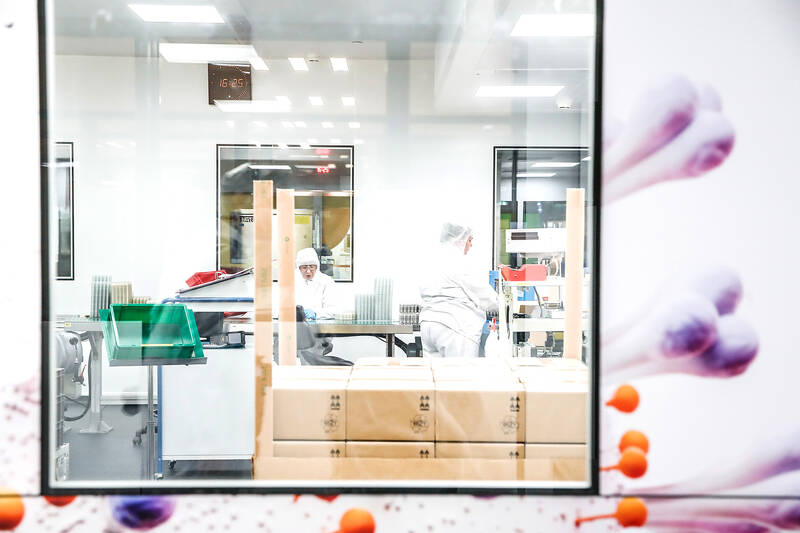GlaxoSmithKline PLC (GSK) yesterday beat expectations for its first-quarter revenue and profit, helped by sales of its blockbuster shingles vaccine Shingrix.
The London-listed drugmaker reported adjusted earnings per share of £0.37 on revenue of about £7 billion (US$8.74 billion).
Analysts were expecting earnings per share of £0.37 on revenue of about £6.5 billion, company-compiled consensus estimates showed.

Photo: EPA-EFE
The company’s blockbuster shingles vaccine generated £833 million, ahead of a GSK-compiled consensus of £829 million.
GSK reaffirmed its guidance for this year.
In February, the company predicted sales growth would this year increase 6 to 8 percent and adjusted operating profit would increase 10 to 12 percent at constant exchange rates.
On Wednesday, the company said it expected adjusted operating profit growth to be lower in the first half of the year, as cost increases are expected to affect drug launches, including its keenly watched respiratory syncytial virus (RSV) vaccine.
The company is a key player in the race that also includes Moderna Inc and Pfizer Inc to develop a safe and effective RSV vaccine, which, if approved, is expected to generate billions in sales.
Pfizer and GSK filed applications for US regulatory approval late last year. An decision on GSK’s application is expected by early next month.
Separately, Roche Holding AG’s first-quarter sales exceeded expectations, as revenue from new drugs helped offset a drop in the market for COVID-19 tests.
Sales fell 6.8 percent to 15.3 billion Swiss francs (US$17.2 billion), the Basel, Switzerland-based company said yesterday, beating analyst estimates.
Sales of eye drug Vabysmo and prescription flu treatment Xofluza exceeded expectations, as did revenue in Japan, thanks to orders of COVID-19 medicine Ronapreve. Cancer drug Tecentriq fell slightly short of expectations.
“In the last year we did have some setbacks,” Roche chief executive officer Thomas Schinecker said on a call with reporters.
Still, the company has more than 14 late-stage trials due to deliver results this year and aims to introduce three new medicines, he said.
“We don’t have to hide. We really see that we have a strong, productive R&D [research and development] organization,” he said.
Vabysmo would help drive growth in the coming years, with “still a lot of runway ahead” for sales, he said.
Additional reporting by Bloomberg

EARLY TALKS: Measures under consideration include convincing allies to match US curbs, further restricting exports of AI chips or GPUs, and blocking Chinese investments US President Donald Trump’s administration is sketching out tougher versions of US semiconductor curbs and pressuring key allies to escalate their restrictions on China’s chip industry, an early indication the new US president plans to expand efforts that began under former US president Joe Biden to limit Beijing’s technological prowess. Trump officials recently met with their Japanese and Dutch counterparts about restricting Tokyo Electron Ltd and ASML Holding NV engineers from maintaining semiconductor gear in China, people familiar with the matter said. The aim, which was also a priority for Biden, is to see key allies match China curbs the US

The popular Taiwan Semiconductor Manufacturing Co (TSMC, 台積電) arbitrage trade might soon see a change in dynamics that could affect the trading of the US listing versus the local one. And for anyone who wants to monetize the elevated premium, Goldman Sachs Group Inc highlights potential trades. A note from the bank’s sales desk published on Friday said that demand for TSMC’s Taipei-traded stock could rise as Taiwan’s regulator is considering an amendment to local exchange-traded funds’ (ETFs) ownership. The changes, which could come in the first half of this year, could push up the current 30 percent single-stock weight limit

PROTECTION: The investigation, which takes aim at exporters such as Canada, Germany and Brazil, came days after Trump unveiled tariff hikes on steel and aluminum products US President Donald Trump on Saturday ordered a probe into potential tariffs on lumber imports — a move threatening to stoke trade tensions — while also pushing for a domestic supply boost. Trump signed an executive order instructing US Secretary of Commerce Howard Lutnick to begin an investigation “to determine the effects on the national security of imports of timber, lumber and their derivative products.” The study might result in new tariffs being imposed, which would pile on top of existing levies. The investigation takes aim at exporters like Canada, Germany and Brazil, with White House officials earlier accusing these economies of

Teleperformance SE, the largest call-center operator in the world, is rolling out an artificial intelligence (AI) system that softens English-speaking Indian workers’ accents in real time in a move the company claims would make them more understandable. The technology, called accent translation, coupled with background noise cancelation, is being deployed in call centers in India, where workers provide customer support to some of Teleperformance’s international clients. The company provides outsourced customer support and content moderation to global companies including Apple Inc, ByteDance Ltd’s (字節跳動) TikTok and Samsung Electronics Co Ltd. “When you have an Indian agent on the line, sometimes it’s hard